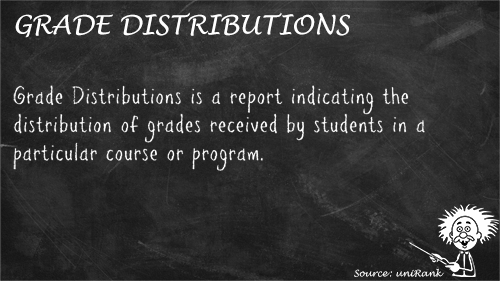
Grade Distributions
What does the academic term Grade Distributions mean in higher education?
Grade Distributions

Short Definition
Grade Distributions is a report indicating the distribution of grades received by students in a particular course or program.
In-depth Overview
Grade Distributions
Long definition: Grade distributions refer to the representation and allocation of grades or marks among students in a specific course, program or academic institution. It involves the breakdown of grades earned by students, typically presented in the form of a statistical summary, histogram or graph. Grade distributions provide insights into the overall performance of students, showing the frequency of each grade (e.g., A, B, C, D, F) and can help educators and institutions evaluate the rigor of courses and ensure fairness in grading.
Etymology: The term "grade" relates to the evaluation of a student's performance in a course, while "distribution" indicates the arrangement or spread of these grades among the student population.
Synonyms or related academic terms: Grade Allocation, Grading Statistics, Mark Distributions.
Examples of Use:
- The grade distribution for the final exam revealed that most students earned a B or higher.
- Faculty members analyze grade distributions to assess the effectiveness of their teaching methods.
- The university regularly reviews grade distributions to ensure grading fairness and academic standards.
Translations:
Spanish: Distribución de Calificaciones
French: Répartition des Notes
German: Notenverteilung
Italian: Distribuzione dei Voti
Portuguese: Distribuição de Notas
Japanese: 成績分布 (Seiseki Bunpu)
Chinese (Simplified): 成绩分布 (Chéngjī Fēnbù)
Hindi: ग्रेड वितरण (Grade Vitaran)
Visitors can search for this term through the uniRank World Universities Search Engine.
unirank Glossary Classification
Miscellaneous higher education terms > University academic terms